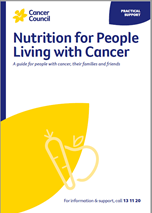Diabetes and pancreatic cancer
Insulin is a hormone that controls the amount of sugar in the blood. Diabetes, or high blood sugar levels, can occur if your pancreas is not making enough insulin. This is why some people develop diabetes shortly before pancreatic cancer is diagnosed (when the cancer is affecting how much insulin the pancreas can make) or soon after surgery (when some or all of the pancreas has been removed).
The way diabetes is managed varies from person to person but often includes both dietary changes and insulin injections. Sometimes medicines are given as tablets that you swallow.
Your GP can help you manage the condition, but you may be referred to an endocrinologist, a specialist in hormone disorders. You may also be referred to a dietitian for help with your diet and to a diabetes specialist nurse, who can help to coordinate your care and provide support.
Coping with diabetes
- Eat small meals and snacks regularly to help control blood sugar levels.
- Talk to your endocrinologist or GP about medicines to help control the diabetes.
- If you are taking diabetes medicine, include high-fibre carbohydrate foods at every meal to avoid low blood sugar levels. Wholegrain breads and cereals, vegetables and fruit are all suitable foods.
- Talk to your doctors and dietitian for more information about diabetes.
- Get in touch with the National Diabetes Services Scheme on 1800 637 700. They can provide advice on managing diabetes.
→ READ MORE: Living with pancreatic cancer
Podcast: Appetite Loss and Nausea
Listen to more episodes from our podcast for people affected by cancer
Prof Lorraine Chantrill, Honorary Clinical Professor, University of Wollongong, and Head of Department, Medical Oncology, Illawarra Shoalhaven Local Health District, NSW; Karen Baker, Consumer; Michelle Denham, 13 11 20 Consultant, Cancer Council WA; Prof Anthony J Gill, Surgical Pathologist, Royal North Shore Hospital and The University of Sydney, NSW; A/Prof Koroush Haghighi, Liver, Pancreas and Upper Gastrointestinal Surgeon, Prince of Wales and St Vincent’s Hospitals, NSW; Dr Meredith Johnston, Radiation Oncologist, Liverpool and Campbelltown Hospitals, NSW; Dr Brett Knowles, Hepato-Pancreato-Biliary and General Surgeon, Royal Melbourne Hospital, Peter MacCallum Cancer Centre, and St Vincent’s Hospital, VIC; Rachael Mackie, Upper GI – Clinical Nurse Consultant, Peter MacCallum Cancer Centre, VIC; Prof Jennifer Philip, Chair of Palliative Care, University of Melbourne, and Palliative Medicine Physician, St Vincent’s Hospital, Peter MacCallum Cancer Centre and Royal Melbourne Hospital, VIC; Lucy Pollerd, Social Worker, Peter MacCallum Cancer Centre, VIC; Rose Rocca, Senior Clinical Dietitian – Upper GI, Peter MacCallum Cancer Centre, VIC; Stefanie Simnadis, Clinical Dietitian, St John of God Subiaco Hospital, WA.
View the Cancer Council NSW editorial policy.
View all publications or call 13 11 20 for free printed copies.
